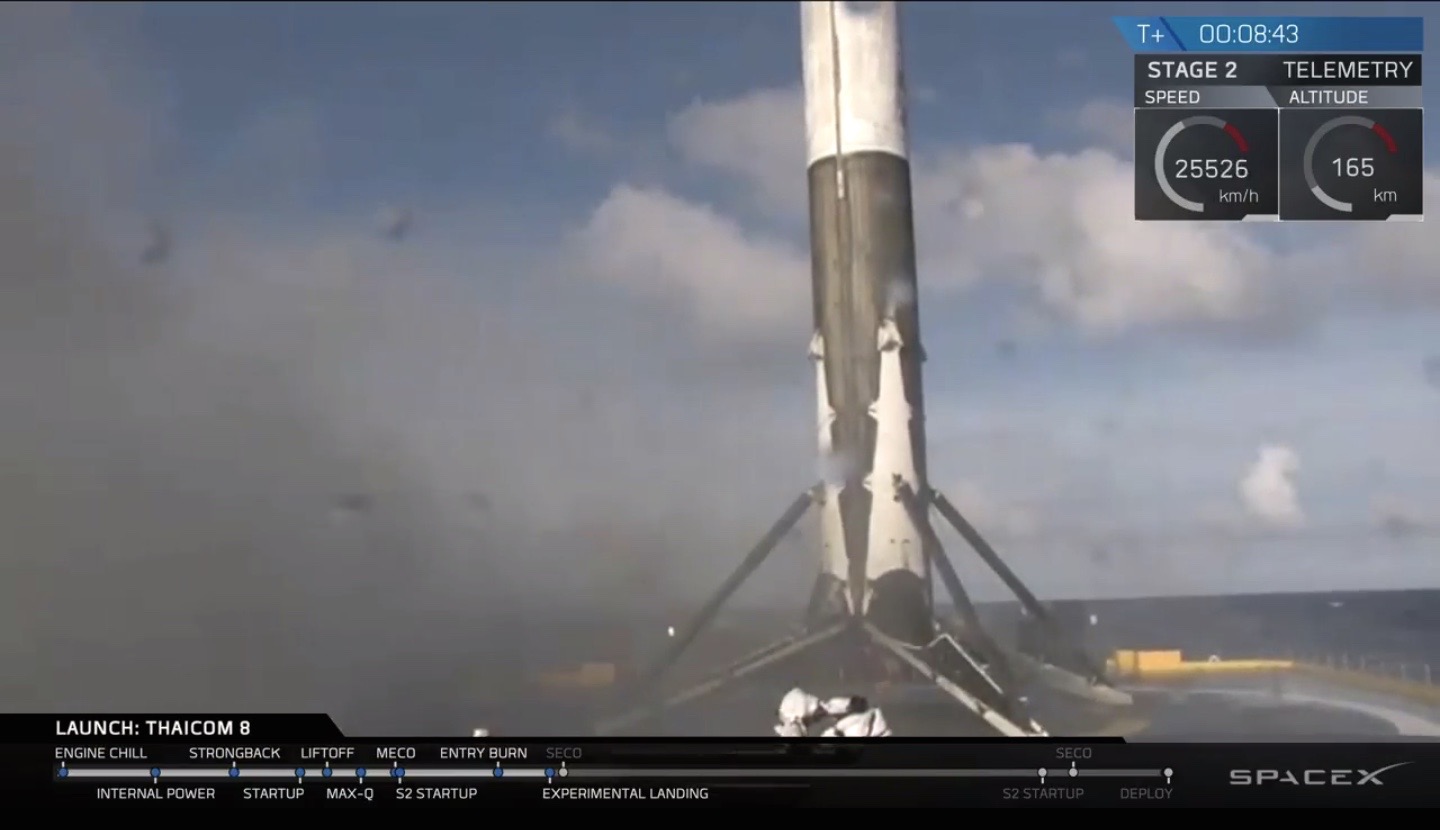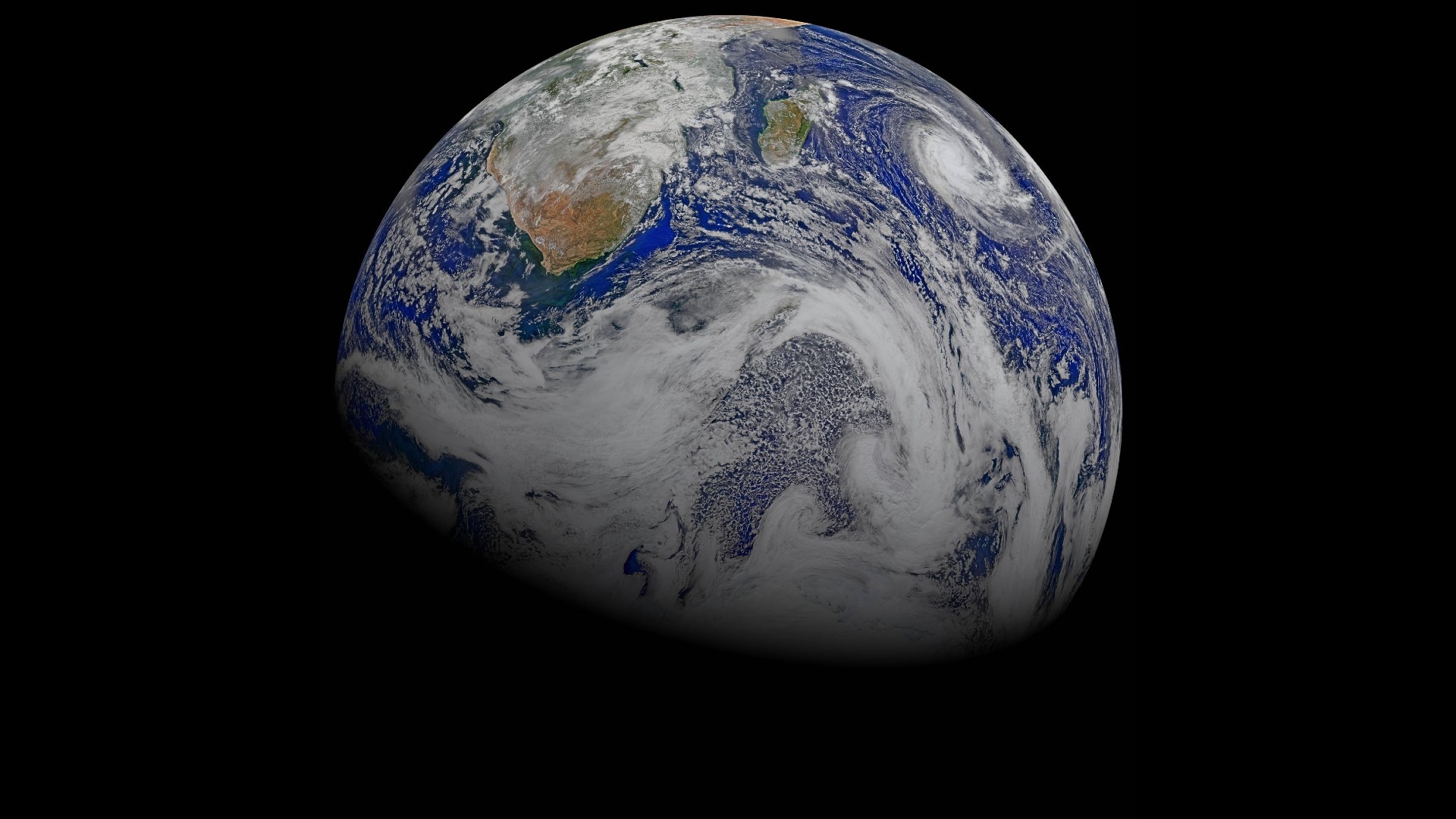Three in a Row! SpaceX Lands Rocket on Ship at Sea Yet Again

SpaceX has just scored a rocket-landing hat trick.
The first stage of the company's Falcon 9 rocket came down for a soft touchdown on a ship at sea today (May 27), during the successful launch of the Thaicom 8 communications satellite. Until last month, this dramatic maritime maneuver had never been done; SpaceX has now pulled it off on three straight flights over the last seven weeks.
The two-stage Falcon 9 lifted off from Florida's Cape Canaveral Air Force Station today at 5:40 p.m. EDT (2140 GMT). About 2.5 minutes into flight, the two rocket stages separated; the second stage carried Thaicom 8 to its prescribed geostationary transfer orbit (GTO), and the first stage performed a series of engine burns to head back to Earth. [Photos: SpaceX Launches Satellite, Lands Rocket]
Less than 9 minutes after liftoff, the Falcon 9 first stage made a pinpoint vertical landing on the deck of "Of Course I Still Love You," one of SpaceX's two "autonomous spaceport droneships," which was stationed 420 miles (680 kilometers) off the Florida coast. When the smoke cleared and it became evident that the rocket was still standing, SpaceX employees at the company's headquarters in Hawthorne, California erupted in raucous cheers.
A successful touchdown was by no means assured. GTO lies far from Earth, meaning the Falcon 9 had to move pretty fast to get Thaicom 8 there.
"Droneship landing challenging — very hot and fast first-stage re-entry," SpaceX representatives said via Twitter Thursday (May 26). (The launch and rocket landing were originally supposed to take place Thursday, but SpaceX pushed things back a day to investigate a possible issue with an actuator in the Falcon 9's upper-stage engine.)
Indeed, today's touchdown put a significant amount of strain on the rocket stage, said SpaceX's billionaire founder and CEO, Elon Musk.
Breaking space news, the latest updates on rocket launches, skywatching events and more!
"Rocket landing speed was close to design max & used up contingency crush core, hence back & forth motion. Prob ok, but some risk of tipping," Musk tweeted today.
SpaceX personnel will likely head out to the droneship soon and — provided the booster does indeed stay upright — weld it to the deck of "Of Course I Still Love You," to stabilize the rocket for the journey back to shore.
SpaceX pulled off a similarly difficult droneship landing just three weeks ago. On May 6, the Falcon 9 first stage touched down on "Of Course I Still Love You" during the launch of the Japanese communications satellite JCSAT-14, which also went to GTO.
The first successful droneship landing, which occurred April 8, featured lower velocities: The Falcon 9 had launched SpaceX's robotic Dragon cargo capsule toward the International Space Station, which circles in low-Earth orbit, just 240 miles (386 km) above the planet's surface. (For comparison, GTO lies about 22,245 miles, or 35,800 km, from Earth.)
SpaceX has also landed a Falcon 9 first stage on terra firma once, pulling off that milestone in December 2015, during the launch of 11 satellites for company customer Orbcomm from Cape Canaveral. (On some missions, the Falcon 9 cannot carry enough fuel to make it all the way back to the launch site, and must therefore touch down on a droneship.)
These experimental landings are part of SpaceX's effort to develop fully and rapidly reusable rockets, a key goal of the company. Indeed, Musk has said that such technology could slash the cost of spaceflight dramatically, perhaps even making Mars colonization economically feasible.
SpaceX isn't alone in this line of thinking. Blue Origin, the spaceflight company run by Amazon.com founder Jeff Bezos, is also developing reusable launch systems, and has launched and landed its New Shepard rocket three times since November 2015. Blue Origin's successes all came during suborbital test flights, whereas SpaceX's landings have occurred during orbital launches.
Thaicom 8, which has a design lifetime of 15 years, will ultimately make its way to a circular geostationary orbit and provide communications services for South Asia and Southeast Asia, SpaceX representatives said. The 6,600-lb. (3,000 kilogram) satellite was built by Orbital ATK and will be operated by the Bangkok-based company Thaicom.
Follow Mike Wall on Twitter @michaeldwall and Google+. Follow us @Spacedotcom, Facebook or Google+. Originally published on Space.com.

Michael Wall is a Senior Space Writer with Space.com and joined the team in 2010. He primarily covers exoplanets, spaceflight and military space, but has been known to dabble in the space art beat. His book about the search for alien life, "Out There," was published on Nov. 13, 2018. Before becoming a science writer, Michael worked as a herpetologist and wildlife biologist. He has a Ph.D. in evolutionary biology from the University of Sydney, Australia, a bachelor's degree from the University of Arizona, and a graduate certificate in science writing from the University of California, Santa Cruz. To find out what his latest project is, you can follow Michael on Twitter.
